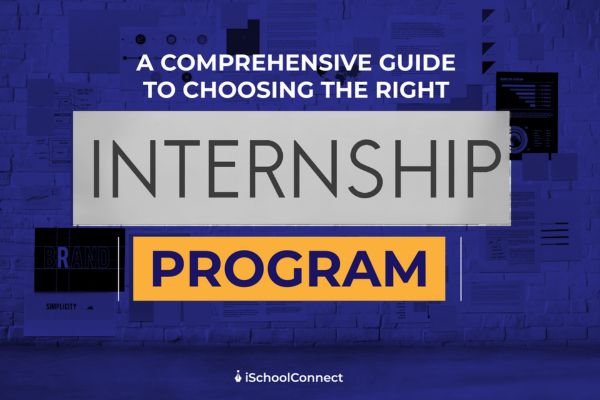Table of Contents
- Let’s find out why it is important to choose the right internship program
- 15 tips on how to choose the right internship program
- 1. Self-assessment
- 2. Define your criteria
- 3. Research industries and companies
- 4. Networking
- 5. Utilize online resources
- 6. Review internship descriptions
- 7. Company research
- 8. Application preparation
- 9. Application submission
- 10. Prepare for the interview
- 11. Consider compensation and benefits
- 12. Company culture fit
- 13. Ask questions
- 14. Evaluate offers
- 15. Trust your instincts
- Key takeaways
- FAQs
Internships are an essential aspect of a student’s academic experience. It makes a person self-sufficient. You’re just a few steps away from graduation, and all you need now is a list of internships to help you figure out what you want to do after college. The only thing is, how can you decide which internship is best for you? The perfect internship can help you build skills, market them, and learn how to use them. The ideal internship coincides with your career aspirations and assists you in discovering your areas of interest. So it is crucial to know how to choose the right internship program, but before that, let’s understand why it is important to choose the right internship program.
Let’s find out why it is important to choose the right internship program
Choosing the right internship program is crucial because it significantly impacts your career development, skill acquisition, and overall professional growth. The top reasons highlight the importance of selecting the right internship program.
Relevant skill development
An internship is a way to gain real-world experience in the field of your choice. By selecting the right program, you can work on projects and tasks aligned with your career goals. This allows you to acquire relevant skills, practical knowledge, and industry-specific expertise to make you more competitive in the job market.
Networking opportunities
Internships are an excellent way to network with people in your field. Choosing a reputable and well-established program can expose you to a valuable network of mentors, colleagues, and industry experts. These associations can lead to future career possibilities, referrals, and insights into industry trends and changes.
Insight into company culture

Internships give you a firsthand look into a company’s day-to-day operations and culture. Selecting an internship with a company whose values and culture align with your own can provide a positive and enriching experience. This insight helps you understand if the company is a suitable fit for your long-term career goals.
Resume building
The right internship adds significant weight to your resume. Potential employers often value practical experience over theoretical knowledge. A well-chosen internship on your resume demonstrates your commitment, initiative, and ability to apply your skills in real-world scenarios.
Future employment opportunities
Internship programs can serve as a gateway to future full-time employment. Companies might consider offering you a permanent position after you graduate if you excel during your internship. Choosing an academic program with this potential will save you time and effort in your future job search.
15 tips on how to choose the right internship program
1. Self-assessment
Start by assessing your skills, interests, and career goals. Consider what you hope to achieve through an internship – gaining specific skills, exploring a particular industry, or building a network. Understanding your own needs and goals will guide your search.
2. Define your criteria
Create a list of criteria important to you in an internship program. This might include factors like industry, company size, location, paid vs. unpaid, duration, remote vs. in-person, and potential for future employment.
3. Research industries and companies
Research industries that align with your interests and career goals. Look into companies within those industries that offer internship programs. Consider factors like company reputation, values, company culture, and the types of projects interns typically work on.
4. Networking
Tap into your network, including your university’s professors, mentors, peers, and career services. They might have insights into potential internship opportunities or recommendations based on your interests.
5. Utilize online resources
Use internship search platforms, company websites, and job boards to find internship openings. Websites like LinkedIn, Indeed, Glassdoor, and InternMatch can be helpful resources for discovering available opportunities.
6. Review internship descriptions
Carefully read internship descriptions to understand the responsibilities, requirements, and qualifications. Make sure the role matches your skills and aligns with your goals.
7. Company research

Research the companies you’re interested in thoroughly. Look into their mission, values, recent news, products or services, and other relevant information. This will help you customize your application and interview responses.
8. Application preparation
Prepare a well-written resume and cover letter emphasizing your relevant abilities and experiences for the internship. Customize each application to the specific role and company.
9. Application submission
Submit your applications according to the instructions provided by each company. Pay attention to deadlines and any additional required materials, such as writing samples or portfolio links.
10. Prepare for the interview
If you receive interview invitations, prepare thoroughly. Research common interview questions, practice your responses, and come up with questions to ask the interviewer. Also, prepare examples of how your skills and experiences align with the internship role.
11. Consider compensation and benefits
Evaluate whether the internship is paid or unpaid and consider benefits such as stipends, transportation allowances, or housing support—factor in the program’s overall value in experience, networking, and skill development.
12. Company culture fit
Consider whether the company’s culture aligns with your values and working style. This can significantly impact your internship experience and potential for future employment.
13. Ask questions
During interviews or networking events, ask questions about the company’s expectations, the scope of the internship, potential projects, and opportunities for learning and growth.
14. Evaluate offers
If you receive multiple offers, evaluate them based on your criteria, including the role’s fit with your goals, potential for skill development, company reputation, and compensation.
15. Trust your instincts
If something feels off or doesn’t align with your values, it’s worth considering other options. On the other hand, if an internship feels like a good fit, your intuition might be leading you in the right direction.
Key takeaways
- Choosing the right internship program is essential for obtaining relevant skills, building a robust professional network, gaining insights into company culture, enhancing your resume, and potentially opening doors for future employment opportunities.
- Thorough study and research will assist you in making an informed selection that corresponds with your professional goals and maximizes the benefits of your internship experience.
- Remember that internships are about what you can offer the company and what you can learn and gain from the experience. This detailed process increases your possibilities of finding an internship that will contribute positively to your career journey.
We hope you found this blog informative and insightful to help you on how to find the right internship opportunities. If you need more information or have further questions about studying abroad? Click here to contact us.
Liked this blog? Read next: SOP for MS at Cornell University | Know how to write a stellar SOP!
FAQs
Q1. Do internships lead to full-time jobs?
Ans. Yes, certain internships can lead to full-time work. The ability to perform well, demonstrate your talents, and create relationships can boost your chances of being granted permanent employment.
Q2. Should I give paid internships a priority over unpaid ones?
Ans. Although unpaid internships can still give useful experience, paid internships offer financial support. Take into account your financial condition, professional aspirations, and the opportunities the internship offers.
Q3. How can I make my application stand out when applying for internship programs?
Ans. Create a resume and cover letter that are effective and specific to each application. Perform market and company research, practice responses to typical interview questions, and practice selling your abilities and expertise.






